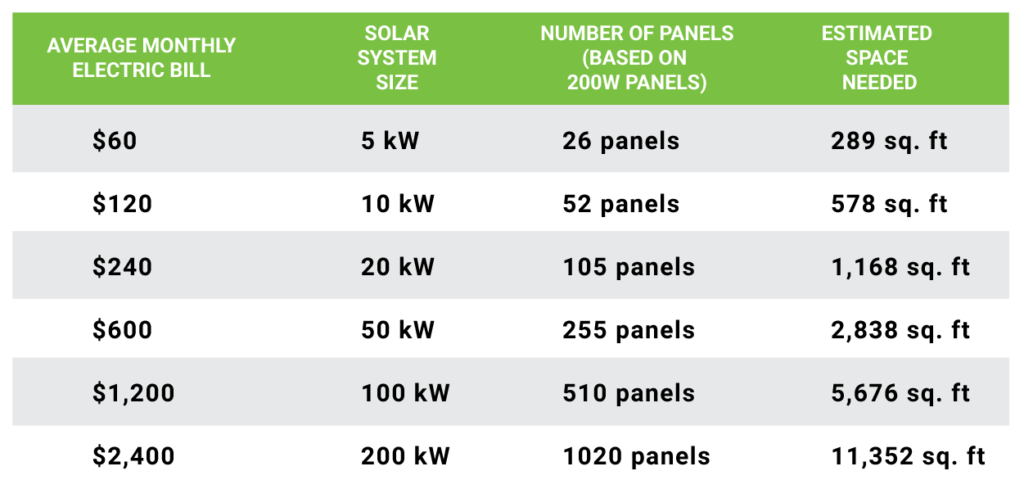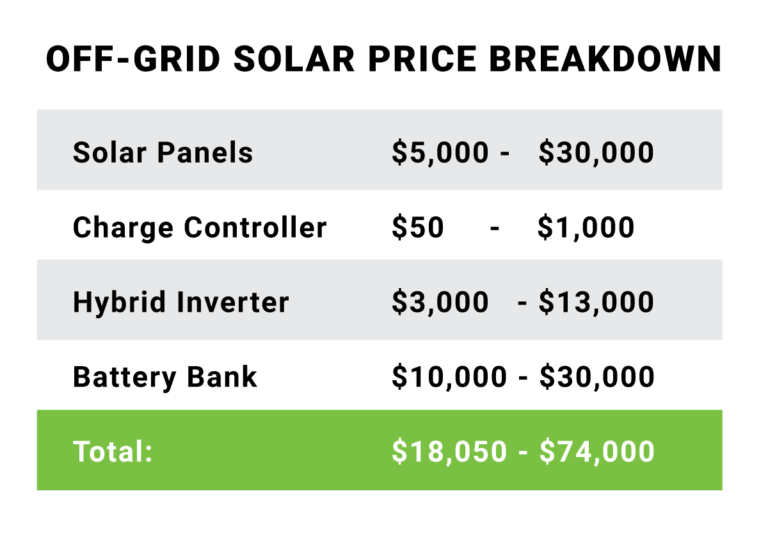Off-Grid Solar in Tampa
An off-grid solar system is a solar structure that operates independently of the power grid, with batteries retaining the solar energy generated. A successful system installation involves a variety of components such as solar panels, battery packs, roof space, and much more. Circuit Electric Solar has the information to assist you to make a more informed decision about investing in an Off-Grid Solar System.
Solar is CLEAN Energy
Using solar power reduces the amount of greenhouse gasses and other pollutants that are released into the atmosphere.
GENERATE YOUR OWN ENERGY
Installing a solar system releases you from the dependence on your local utility, saving you thousands of dollars.
Invest in your own Energy
The expected return on your investment in solar energy is greater than you think. Many times it will outpace standard financial instruments such as stocks, bonds, mutual funds, and CD's.
Off-Grid Solar Systems
Circuit Electric Solar is a team of specialized solar installers for your Tampa home or business. Our mission is to be the finest renewable energy supplier, focusing on assisting homeowners and business owners in reducing their carbon footprint in order to speed the world's transition to sustainable energy while lowering their costs. Because of the huge demand from our consumers, CES Solar was formed to provide solar panels and energy efficiency solutions. Our objective is to deliver a better solution at a cheaper rate. Our business strategy helps us do that by eliminating industry-standard inflated sales commissions and restricting regional offices, resulting in reduced consumer pricing for high-quality energy solutions.
What is an Off-Grid Solar System?
An off-grid solar system is intended to satisfy customized power demands and requirements. Unlike grid-tied systems, they have no connection to the utility grid and must generate all of the electricity required to power your house.
A battery bank provides the energy that off-grid systems rely on. Your off-grid solar system must be adequately designed to fulfill your daily power demands while also replacing the stored energy used from the battery bank
How Does An Off-Grid Solar System Work?
The innovation of the system distinguishes a successful off-grid solar energy system. Solar panels, charge controllers, batteries, and inverters are all critical elements of a robust off-grid solar system. They power the light in your room as well as the ovens in your kitchen when they work together.
Off-grid solar energy systems function via:
- Panels for solar energy (PV array): Solar panels convert sunlight into electricity and can be installed on your home, in an open space, or on your roof. The panels are connected to an inverter or a charge controller, which controls the flow of electricity from the panels.
- Controlled Chargers: The charge controller is the fundamental link between all of the components required for effective off-grid operation. Charge controllers guarantee that the quantity of power applied by the solar panels does not overwhelm the solar panels and battery.
- Battery Banks: The battery bank serves as the off-grid solar system’s core. The quantity of battery bank that you have is the primary source of maintaining Off-Grid systems operational throughout their working procedure. It saves surplus energy for gloomy times throughout the day (and nighttime), and when necessary, it sends power to the inverters.
- Inverters: Inverters transform DC power into AC power to be sent to your gadgets or appliances as DC power, allowing you to turn on the TV.
Off-Grid vs. On-Grid Solar
There are two major options that you can choose from how to get your source of solar. Off-Grid and On-Grid Solar are two strong resources to obtain solar power for your property. As both are effective machines to power your source, they do both come with a load of different aspects of it all.
Off-Grid
Off-grid solutions are essential for storing and conserving solar electricity in batteries for usage when the grid goes down. Its idea is intended to be self-sustaining and a reliable supply. When the electricity grid is down, off-grid solar farms supply power to important loads. Specialized equipment is required to make this work effectively. These systems require batteries that are expensive and large. They are pricey and need a complicated installation process.
On-Grid
When the utility power grid is operational, on-grid solar systems receive electricity and connect directly to the utility feed. While overproducing, the on-grid system sends extra electricity to the utility grid. On-Grid is a low-cost and easy-to-install solution. It can be implemented with or without net metering. The rate at which solar power is netted is credited in the absence of net metering. The customer is credited for the excess solar power produced at a rate that is determined by the electric utility. The disadvantage of an on-grid system is that it does not deliver energy if the grid fails
How Many Solar Panels Are Required for Off-Grid Living?
The quantity of solar panels required, as well as a few other major elements, decide whether or not you can go off the grid.
- Electricity Consumption Roof Space that can be used
- The amount of sunlight that is aimed at you on a daily basis.
- Solar panel type
To run a typical off-grid residence, it takes around 7,000 watts of power.
Solar panels are available in different sizes, depending on the energy demand of the off-grid system and the performance output of each panel.
Popular sizes are:
- 100-watt solar panel: 47″ x 21.3″ x 1.4″
- 200-watt solar panel is 58.7″ x 26.8″ x 1.4″.
*Remember, the larger panel = the highest performing panel
We’ve created a chart to assist you in determining a general estimate of what you require in your specific situation:

How much does an off-grid solar system cost?
Making the decision to take your home completely off-grid with solar power is an involved and more expensive decision than many people are aware of. Although, going off-grid with solar power is one of the most viable solutions for a home that’s located in an area where relying on sunlight is the best energy solution. Having a basic understanding of the expenses associated with an off-grid solar system is a useful first step in determining whether off-grid is a suitable fit for your house.
We’ve created a list of necessary characteristics to make your off-grid source the best option:

Solar Tax Credit
When individuals speak to the ‘Florida solar tax credit,’ they are referring to the federal investment tax credit, which is worth 26%. (ITC). This is a federal incentive that is accessible in all 50 states. It gives tax-paying households the power to deduct 26 percent of the cost of their solar system from their income taxes.
In other words, the federal tax credit provides a 26 percent discount on your solar system. If your tax liability is less than 26 percent of the cost of your solar system, you are able to roll over the remaining amount forward for up to ten years.
Who is Circuit Electric Solar?
Circuit Electric Solar is a specialized team of solar installation for your Tampa house or company. Our objective is to be the best renewable energy supplier in the world, focused on supporting households and business owners in decreasing their carbon footprint to accelerate the world’s transition to sustainable energy while lowering their expenses. CES Solar was founded in response to a high demand from our customers for solar panels and energy efficiency solutions. Our goal is to provide a better solution at a lower cost. Our business model assists us in doing this by eliminating industry-standard inflated sales commissions and limiting regional offices, resulting in lower customer pricing for high-quality energy solutions.
FREE ENERGY AUDIT
Off-Grid Solar Battery
A solar battery is a battery that stores the energy your solar panels produce when they’re exposed to sunlight. This stored energy can then be used to power your home at night or during cloudy weather.
When you add a solar battery to your home, you’ll be able to use more of the electricity generated by your solar panels. Any excess electricity generated by your panels goes back into the grid without a battery, and adding a battery allows you to store that excess electricity for future use.
A solar battery also provides backup power in case of an outage and protective services for any sensitive electronics in your home. The backup power will allow you to stay comfortable and connected during an outage, and it protects your sensitive electronics from harmful voltage fluctuations caused by outages and frequency variations
How Do Solar Batteries Function?
Solar batteries work in conjunction with your solar panels and inverter. When the sun is out, and your solar panels are generating electricity, that power either goes directly to power your appliances, or it’s sent to the battery to be stored for later. And when there isn’t enough electricity coming in from the sun, the stored energy from a solar battery is used to provide electricity to your home.
What's in a Solar Battery?
The main components of most solar batteries are lead plates, sulfuric acid electrolytes, and a plastic case. The lead plates store all of the energy you’re creating with your solar panels. The sulfuric acid electrolyte releases electrons through a chemical reaction that happens when the lead plates interact with each other.
This creates an electric current that flows directly through wires connected to the solar battery that powers your appliances. The plastic case protects everything inside from damage and corrosion, plus it keeps water from getting in and causing problems.
How Many Batteries Are Required for Off-Grid Solar?
To answer how many batteries you need, you have to answer a more fundamental question: What are your goals? If you’re looking to save money, you’ll want to buy a battery system that allows you to reduce your energy bills. This means that your battery needs to be big enough to store excess energy generated by your solar panels during the day so that they can be used during peak hours when electricity is more expensive. In this case, size is what matters. And to make sure you’re getting the most bang for your buck, you’ll want to take advantage of net metering credits as well as time-of-use rates. If you want resiliency — or backup power — then a battery’s capacity isn’t as important as its power rating. When the grid goes down, the utility will signal to tell everyone’s solar panels to shut off (to prevent back-feeding). But if your house has a battery system, it can keep powering on without relying on the grid. However, not all batteries are created equal when it comes to backup power. The grid could go down at any time of day, and only some batteries can charge fast enough or deliver enough power at once.
Types of Solar Batteries
There are many different types of solar batteries – each with its strengths and weaknesses. We’ll explain the basics of each of the most common types used to help you better understand what will be best for your system and needs.
Lead Acid
Historically, lead-acid batteries have been the most commonly used type of battery for home solar storage. Their bulky size and poor appearance have been overcome by their long working life, reliability, and low cost. However, they are being rapidly replaced by newer types of batteries that are lighter, cheaper, and boast more extended warranties.
Lithium-Ion
Lithium-ion batteries are evolving rapidly. They are lighter and compact than previous battery models and are gaining ground with home solar storage systems. Although these batteries require little regular maintenance, they are more expensive than other batteries on the market.
Nickel Cadmium
Nickel-Cadmium batteries, once widely in use but now supplanted mainly by other rechargeable battery technologies, retain a niche role in solar and aircraft applications. These batteries use a combination of nickel and cadmium metals to produce electricity. Because they do not require complex battery management systems or maintenance, they have been used in applications requiring high-durability batteries with long lifetimes.
Because the toxic cadmium used in these batteries is highly toxic, it can be difficult to dispose of. However, they are durable and can operate at high temperatures, making them ideal in extreme situations.
Flow Batteries
Flow batteries are used for residential energy storage. Their water-based solution of zinc-bromide sloshing around inside them enables these batteries to provide more extended periods of power for households than is usual for a battery of their size. They can also operate at a vast range of temperatures without a heating and cooling system—an essential point, especially when living in Florida, where summer temperatures reach into the 100s.
What Type of Battery is Best for Solar?
Now that the solar panels you need for your home have been installed, you may be wondering about which type of battery is best for solar power? When selecting which solar battery to use, you’ll have to consider some specific characteristics for a clearer choice. Some things to consider are round-trip efficiency, solar battery life & warranty, depth of discharge (DoD), capacity, and price.
Why Would You Get a Solar Battery?
There are a few reasons why you might want to consider installing a solar battery for your home.
Most people will want to add solar batteries because they:
- want to run their home on solar power even when the sun isn’t shining
- want to take full advantage of the electricity their solar panels
- generate want to hedge against future power outages
- want to reduce their electric bill by taking advantage of time-of-use rates
Circuit Electric Solar is Here for All of Your Solar Needs
Above all else, choosing the correct solar battery can be a daunting task. There are a variety of variables to consider, such as battery efficiency, battery life, lifespan, and warranty. And on top of that, there’s the fact that solar energy systems come in all different sizes, shapes, and configurations. Regardless of the system you choose, one thing is for sure: having access to an effective solar battery is critical if you want to maximize the performance of your solar energy system.
At Circuit Electric Solar, our specialists can help you choose the perfect battery for your new solar system. Contact us today to schedule a consultation and a free energy audit with one of Florida’s top solar installation companies.
